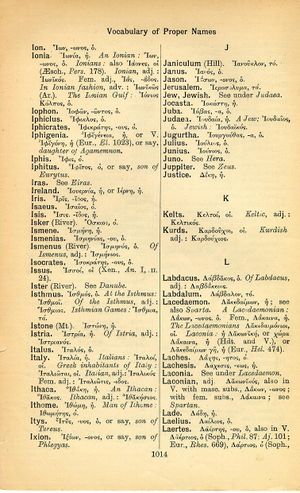Ixion: Difference between revisions
πᾶσά τε ἐπιστήμη χωριζομένη δικαιοσύνης καὶ τῆς ἄλλης ἀρετῆς πανουργία, οὐ σοφία φαίνεται → every knowledge, when separated from justice and the other virtues, ought to be called cunning rather than wisdom | every form of knowledge when sundered from justice and the rest of virtue is seen to be plain roguery rather than wisdom
(6_9) |
|||
| Line 3: | Line 3: | ||
}} | }} | ||
{{Lewis | {{Lewis | ||
|lshtext=<b>Ixīon</b>: ŏnis, m., = [[Ἰξίων]],><br /><b>I</b> the [[son]] of [[Phlegyas]] (acc. to others, of Antion or of Jupiter), [[king]] of the Lapithæ in [[Thessaly]], and [[father]] of Pirithoüs. He murdered his [[father]]-in-[[law]], to [[avoid]] paying the [[nuptial]] presents; and as no one would [[absolve]] him [[after]] [[such]] a [[deed]], Jupiter took him [[into]] [[heaven]] and [[there]] purified him. When, [[notwithstanding]] this, he made an [[attempt]] on the [[chastity]] of [[Juno]], Jupiter substituted for her an [[image]] of [[cloud]], [[with]] [[which]] he begat the Centaurs; [[but]] having boasted of his [[imaginary]] [[criminal]] [[success]] [[with]] [[Juno]], Jupiter hurled him [[into]] [[Tartarus]], [[where]] he [[was]] [[bound]] [[fast]] to an [[ever]]-revolving [[wheel]], Ov. M. 4, 465; 10, 42; Verg. A. 6, 601: Ixione [[natus]], i. e. Pirithoüs, Ov. M. 12, 210: Ixione nati, the Centaurs. id. ib. 12, 504.—<br /><b>II</b> Derivv.<br /> <b>A</b> Ixīŏnĭus (-onĕus), a, um, adj., of or belonging to [[Ixion]]: Ixionei [[rota]] [[orbis]], Verg. G. 4, 484: Ixionii amici, Lampr. Heliog. 24.—<br /> <b>B</b> Ixīŏnĭdes, ae, m., [[son]] of [[Ixion]], i. e. Pirithoüs, Prop. 2, 1, 38.—In | |lshtext=<b>Ixīon</b>: ŏnis, m., = [[Ἰξίων]],><br /><b>I</b> the [[son]] of [[Phlegyas]] (acc. to others, of Antion or of Jupiter), [[king]] of the Lapithæ in [[Thessaly]], and [[father]] of Pirithoüs. He murdered his [[father]]-in-[[law]], to [[avoid]] paying the [[nuptial]] presents; and as no one would [[absolve]] him [[after]] [[such]] a [[deed]], Jupiter took him [[into]] [[heaven]] and [[there]] purified him. When, [[notwithstanding]] this, he made an [[attempt]] on the [[chastity]] of [[Juno]], Jupiter substituted for her an [[image]] of [[cloud]], [[with]] [[which]] he begat the Centaurs; [[but]] having boasted of his [[imaginary]] [[criminal]] [[success]] [[with]] [[Juno]], Jupiter hurled him [[into]] [[Tartarus]], [[where]] he [[was]] [[bound]] [[fast]] to an [[ever]]-revolving [[wheel]], Ov. M. 4, 465; 10, 42; Verg. A. 6, 601: Ixione [[natus]], i. e. Pirithoüs, Ov. M. 12, 210: Ixione nati, the Centaurs. id. ib. 12, 504.—<br /><b>II</b> Derivv.<br /> <b>A</b> Ixīŏnĭus (-onĕus), a, um, adj., of or belonging to [[Ixion]]: Ixionei [[rota]] [[orbis]], Verg. G. 4, 484: Ixionii amici, Lampr. Heliog. 24.—<br /> <b>B</b> Ixīŏnĭdes, ae, m., [[son]] of [[Ixion]], i. e. Pirithoüs, Prop. 2, 1, 38.—In plur.: Ixīŏnĭdae, ārum, the Centaurs, Luc. 6, 386; Ov. M. 8, 566. | ||
}} | }} | ||
Revision as of 09:23, 13 August 2017
English > Greek (Woodhouse)
Ἰξίων, -ονος, or say, son of Phlegyas.
Latin > English (Lewis & Short)
Ixīon: ŏnis, m., = Ἰξίων,>
I the son of Phlegyas (acc. to others, of Antion or of Jupiter), king of the Lapithæ in Thessaly, and father of Pirithoüs. He murdered his father-in-law, to avoid paying the nuptial presents; and as no one would absolve him after such a deed, Jupiter took him into heaven and there purified him. When, notwithstanding this, he made an attempt on the chastity of Juno, Jupiter substituted for her an image of cloud, with which he begat the Centaurs; but having boasted of his imaginary criminal success with Juno, Jupiter hurled him into Tartarus, where he was bound fast to an ever-revolving wheel, Ov. M. 4, 465; 10, 42; Verg. A. 6, 601: Ixione natus, i. e. Pirithoüs, Ov. M. 12, 210: Ixione nati, the Centaurs. id. ib. 12, 504.—
II Derivv.
A Ixīŏnĭus (-onĕus), a, um, adj., of or belonging to Ixion: Ixionei rota orbis, Verg. G. 4, 484: Ixionii amici, Lampr. Heliog. 24.—
B Ixīŏnĭdes, ae, m., son of Ixion, i. e. Pirithoüs, Prop. 2, 1, 38.—In plur.: Ixīŏnĭdae, ārum, the Centaurs, Luc. 6, 386; Ov. M. 8, 566.

